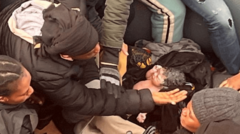This week, Spanish coast guards confirmed the birth of a baby on a crowded inflatable raft as it was rescued off Lanzarote. The rescue took place on January 6, coinciding with Spain’s celebration of the Epiphany, a holiday known for gift-giving to children. The captain of the rescue operation, Domingo Trujillo, described the scene as surprising; they were aware of a pregnant woman aboard, but discovering a newborn shortly after birth was unexpected. The mother had reportedly been lying on the raft's floor, while another passenger cradled the infant.
Following the rescue, the mother and baby were airlifted to a hospital on Lanzarote for medical attention, and fortunately, no major complications were reported. Álvaro Serrano Pérez, the commander of the helicopter, expressed a poignant sentiment, stating that the baby’s birth was the best gift they could have received on such a meaningful day.
The overall context highlights the dangerous journeys that many migrants endure in hopes of reaching Europe. Last year alone, more than 46,800 undocumented migrants undertook the perilous route to the Canary Islands, according to data from the Spanish government.
January 6th is also recognized in Spain as "El Dia de los Reyes" (the Day of the Kings), celebrated with traditions involving children preparing their shoes for presents from the biblical Magi. This intertwining of joyful cultural practices with distressing migratory realities encapsulates the duality of hope and hardship experienced by many. As Spain increasingly looks to immigration to bolster its economy, stories like this underscore the personal stakes involved in the broader immigration debate.
Following the rescue, the mother and baby were airlifted to a hospital on Lanzarote for medical attention, and fortunately, no major complications were reported. Álvaro Serrano Pérez, the commander of the helicopter, expressed a poignant sentiment, stating that the baby’s birth was the best gift they could have received on such a meaningful day.
The overall context highlights the dangerous journeys that many migrants endure in hopes of reaching Europe. Last year alone, more than 46,800 undocumented migrants undertook the perilous route to the Canary Islands, according to data from the Spanish government.
January 6th is also recognized in Spain as "El Dia de los Reyes" (the Day of the Kings), celebrated with traditions involving children preparing their shoes for presents from the biblical Magi. This intertwining of joyful cultural practices with distressing migratory realities encapsulates the duality of hope and hardship experienced by many. As Spain increasingly looks to immigration to bolster its economy, stories like this underscore the personal stakes involved in the broader immigration debate.



















